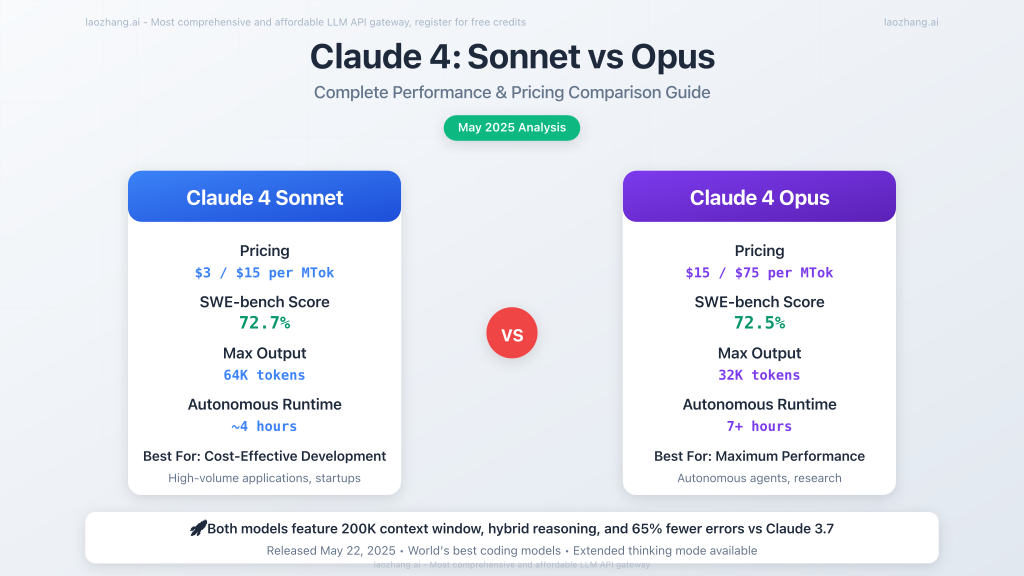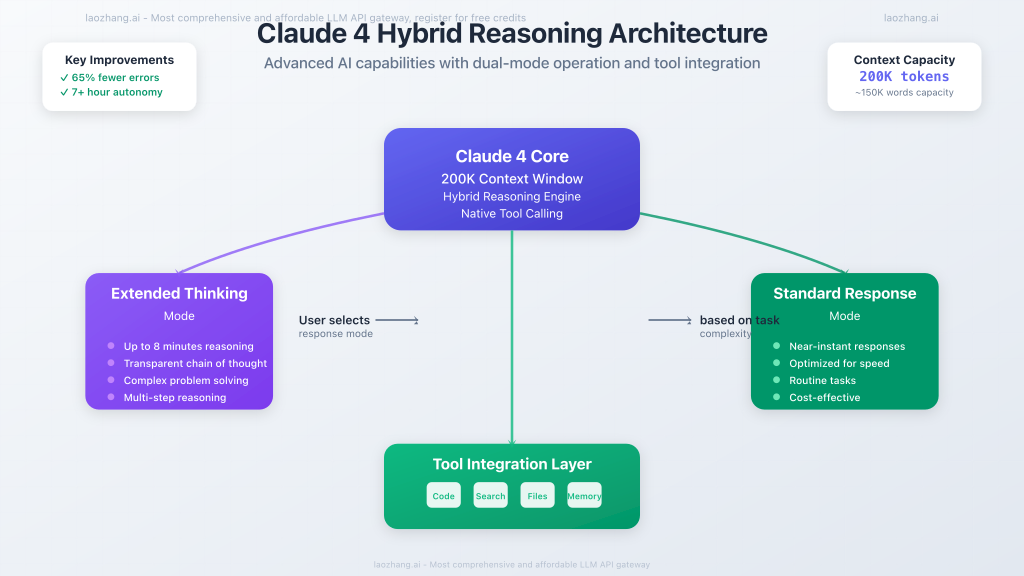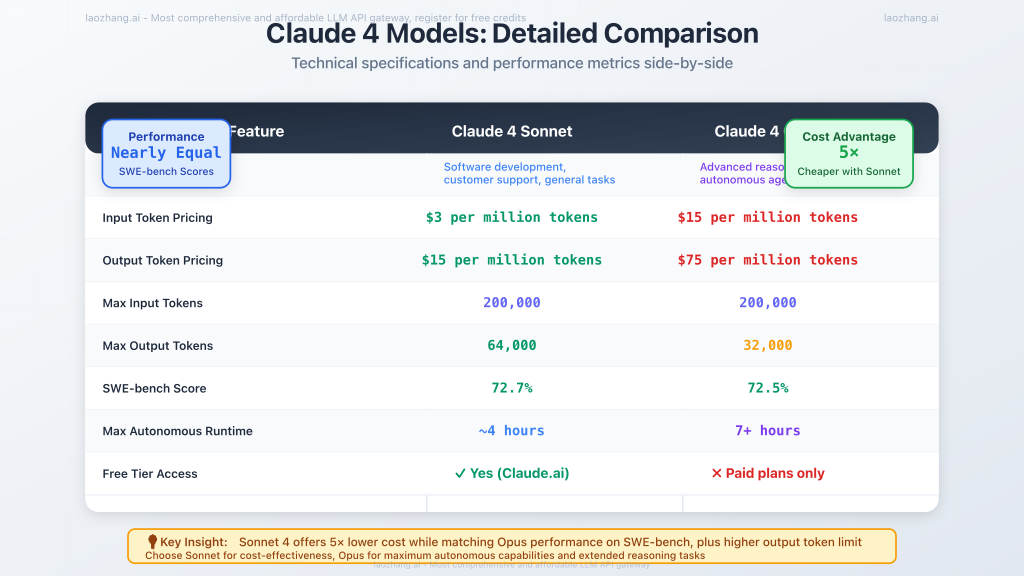✅ Updated May 2025 – Latest Claude 4 Analysis
Claude 4 Sonnet vs Opus: Complete Performance and Pricing Comparison Guide (May 2025)

Anthropic has just released Claude 4 Sonnet and Claude 4 Opus on May 22, 2025, marking a significant leap in AI model capabilities. Both models introduce hybrid reasoning, extended thinking modes, and record-breaking performance on coding benchmarks. However, choosing between these two powerful models depends on your specific needs, budget constraints, and use case requirements.
In this comprehensive comparison, we’ll analyze the key differences between Claude 4 Sonnet and Opus, including pricing structures, performance benchmarks, coding capabilities, and real-world applications. Whether you’re a developer, enterprise user, or AI enthusiast, this guide will help you make an informed decision about which Claude 4 model best serves your needs.
🔥 Key Findings at a Glance
- Claude 4 Sonnet: 5× cheaper than Opus while matching its SWE-bench performance (72.7%)
- Claude 4 Opus: World’s best coding model with 7+ hour autonomous runtime capability
- Both models feature 200K context windows and hybrid reasoning architecture
- 65% reduction in shortcut errors compared to Claude 3.7 Sonnet
Overview: Claude 4 Model Architecture and Features
Both Claude 4 Sonnet and Opus represent Anthropic’s latest hybrid reasoning models, introducing revolutionary capabilities that bridge the gap between traditional language models and autonomous AI agents. Released on May 22, 2025, these models incorporate several breakthrough features:

Shared Core Features
- Hybrid Reasoning Architecture: Dual-mode operation allowing instant responses or extended thinking (up to 8 minutes)
- 200K Token Context Window: Industry-leading context retention for complex tasks
- Native Tool Calling: Built-in Python sandbox and web search capabilities
- Transparent Chain of Thought: Thinking summaries expose reasoning steps for auditability
- Enhanced Safety Rails: 65% reduction in shortcut-seeking behavior
- Memory Management: Local file access for sustained context across hours-long tasks
Detailed Comparison: Claude 4 Sonnet vs Opus

Technical Specifications Comparison
| Feature | Claude 4 Sonnet | Claude 4 Opus |
|---|---|---|
| Primary Use Case | Software development, customer support, general tasks | Advanced reasoning, autonomous agents, complex research |
| Input Token Pricing | $3 per million tokens | $15 per million tokens |
| Output Token Pricing | $15 per million tokens | $75 per million tokens |
| Max Input Tokens | 200,000 | 200,000 |
| Max Output Tokens | 64,000 | 32,000 |
| SWE-bench Score | 72.7% | 72.5% |
| Terminal-bench Score | Not specified | 43.2% |
| Max Autonomous Runtime | ~4 hours | 7+ hours |
| Free Tier Access | Yes (Claude.ai) | No (Paid plans only) |
Performance Benchmarks: How They Stack Up
Both Claude 4 models demonstrate exceptional performance across industry-standard benchmarks, often surpassing competing models from OpenAI and Google. Here’s how they compare in key performance areas:
Coding Performance
Anthropic claims Claude 4 Opus as the “best coding model in the world,” and the benchmarks support this assertion:
- SWE-bench Verified: Claude 4 Sonnet (72.7%) slightly outperforms Claude 4 Opus (72.5%), both significantly ahead of GPT-4.1 (69.1%) and Gemini 2.5 Pro (63.2%)
- Terminal-bench: Claude 4 Opus leads with 43.2% vs GPT-4.1’s 30.3%
- Real-world testing: Rakuten achieved a 7-hour autonomous refactor using Opus 4
💡 Expert Insight
While Sonnet 4 slightly edges out Opus in SWE-bench scores, Opus demonstrates superior performance in complex, multi-step reasoning tasks that require sustained focus over hours.
Competitive Analysis: Claude 4 vs Market Leaders
| Metric | Claude 4 Opus | Claude 4 Sonnet | GPT-4.1 | Gemini 2.5 Pro |
|---|---|---|---|---|
| SWE-bench Verified | 72.5% | 72.7% | 69.1% | 63.2% |
| Terminal-bench | 43.2% | — | 30.3% | 25.3% |
| Max Continuous Task | 7+ hours | ~4 hours | ~2 hours | ~1.5 hours |
| Input/Output Pricing | $15/$75 | $3/$15 | $15/$75 | $10/$30 |
Pricing Analysis: Cost-Effectiveness Comparison
The pricing structure between Claude 4 Sonnet and Opus reflects their intended use cases, with Sonnet offering exceptional value for most applications:
Cost Breakdown Analysis
Claude 4 Sonnet – The Cost-Effective Choice
- Input: $3 per million tokens
- Output: $15 per million tokens
- Cost Advantage: 5× cheaper than Opus
- Best For: High-volume applications, startups, cost-sensitive deployments
Claude 4 Opus – Premium Performance
- Input: $15 per million tokens
- Output: $75 per million tokens
- Premium Features: Longer autonomous runtime, superior reasoning
- Best For: Complex research, autonomous agents, enterprise applications
Real-World Cost Examples
To illustrate the practical cost differences, here are examples for common use cases:
- Customer Support Bot (1M tokens/month):
- Sonnet 4: $18/month (3M input + 15M output)
- Opus 4: $90/month (15M input + 75M output)
- Code Generation Project (500K input, 2M output):
- Sonnet 4: $31.50
- Opus 4: $157.50
⚠️ Important Cost Considerations
Extended thinking mode incurs additional costs as it keeps the context window open longer. Factor this into your budget for complex reasoning tasks.
Use Cases and Applications
Claude 4 Sonnet: Ideal Scenarios
Claude 4 Sonnet excels in scenarios where cost-effectiveness meets high performance:
- Software Development: Code generation, debugging, and refactoring with 64K output tokens
- Customer Support: Intelligent chatbots with better instruction-following and tone control
- Content Creation: High-quality content generation and analysis at scale
- Document Processing: Visual data extraction from charts, graphs, and diagrams
- Screen Automation: RPA applications with computer interaction capabilities
- Educational Tools: Knowledge-base Q&A with high accuracy and minimal hallucinations
Claude 4 Opus: Premium Applications
Claude 4 Opus is designed for the most demanding AI applications:
- Autonomous AI Agents: Multi-channel campaign management and workflow orchestration
- Advanced Research: Hours-long independent research across complex information landscapes
- Complex Coding Projects: Multi-file refactoring and extensive generation projects
- Enterprise Decision Making: Strategic analysis requiring sustained reasoning
- Creative Writing: Human-quality content with rich character development
- Patent Analysis: Comprehensive analysis of patent databases and technical documents
Developer Tools and Integration
Both Claude 4 models benefit from Anthropic’s expanded developer ecosystem:
Claude Code Suite
- IDE Integrations: VS Code and JetBrains extensions for inline coding assistance
- CLI and SDK: Headless coding agents for CI/CD workflows
- GitHub Bot: Automated PR reviews and build fixes
- Code Execution Tool: Secure Python sandbox for real-time testing
API Access and Platforms
Both models are available across multiple platforms:
- Direct API: Anthropic API with streaming and function calling
- Cloud Platforms: Amazon Bedrock and Google Cloud Vertex AI
- Consumer Access: Claude.ai web interface and mobile apps
- Enterprise Tools: GitHub Copilot integration (rolling out)
Safety and Reliability Improvements
Both Claude 4 models incorporate significant safety enhancements:
Enhanced Safety Features
- Reduced Shortcut Behavior: 65% decrease in policy loophole exploitation compared to Claude 3.7
- ASL-3 Safety Standards: Rigorous red-teaming and stress-testing protocols
- Transparent Reasoning: Thinking summaries allow for logic auditing and bias detection
- Fine-grained Controls: Policy-dial sliders for balancing creativity with compliance
Migration Guide: Upgrading from Claude 3
If you’re currently using Claude 3 models, here’s what to expect when upgrading:
Claude 3.7 Sonnet → Claude 4 Sonnet
- Performance Gains: Same pricing, 65% fewer errors, enhanced reasoning
- New Features: Tool use, memory capabilities, extended thinking
- API Compatibility: Seamless upgrade with existing integrations
Claude 3 Opus → Claude 4 Opus
- Capability Boost: Extended autonomous runtime, better coding performance
- Same Pricing: No cost increase despite significant improvements
- Enhanced Tools: Native tool calling and memory management
Frequently Asked Questions
When should I choose Claude 4 Sonnet over Opus?
Choose Sonnet 4 when cost-effectiveness is important and your tasks don’t require extended autonomous operation. It delivers near-equal performance to Opus for most coding and content generation tasks at 5× lower cost.
What is extended thinking mode and how much does it cost?
Extended thinking allows Claude to spend up to 8 minutes reasoning through complex problems. It costs more as it keeps the context window open longer, but significantly improves accuracy for complex reasoning tasks.
Can Claude 4 models work autonomously for hours?
Yes, Claude 4 Opus can work autonomously for 7+ hours on complex tasks, while Sonnet 4 typically handles ~4 hours. This makes them suitable for long-running agent applications.
How do Claude 4 models compare to GPT-4.1?
Claude 4 models outperform GPT-4.1 on coding benchmarks (SWE-bench, Terminal-bench) and offer longer autonomous runtime. GPT-4.1 may still lead in some creative writing and multimodal tasks.
Are Claude 4 models available for free?
Claude 4 Sonnet is available on the free tier of Claude.ai, while Opus requires a paid subscription (Pro, Team, or Enterprise).
What’s the difference in output token limits?
Interestingly, Sonnet 4 supports up to 64K output tokens compared to Opus 4’s 32K limit, making Sonnet better for generating large documents or extensive code.
Expert Recommendations
Choose Claude 4 Sonnet If:
- Budget constraints are a primary concern
- You need high-volume processing capabilities
- Your use cases involve standard software development tasks
- You require large output generation (up to 64K tokens)
- You’re building customer-facing applications
Choose Claude 4 Opus If:
- You need maximum reasoning capabilities
- Your applications require autonomous operation for hours
- Complex research and analysis are primary use cases
- You’re building sophisticated AI agents
- Performance matters more than cost
Future Outlook and Roadmap
Anthropic has hinted at several upcoming features for the Claude 4 series:
- Multimodal Inputs: Enhanced image and potentially video processing capabilities
- Fine-tuning Support: Custom model training for specific use cases
- Tool Chain Orchestration: Dynamic coordination of multiple external tools
- IDE Telemetry: Deeper integration with development environments
Conclusion: Making the Right Choice
The choice between Claude 4 Sonnet and Opus ultimately depends on your specific requirements, budget, and use case complexity. Claude 4 Sonnet represents exceptional value, delivering near-flagship performance at a fraction of the cost, making it ideal for most developers and businesses. Claude 4 Opus justifies its premium pricing through superior autonomous capabilities and extended reasoning performance, making it essential for cutting-edge AI applications.
🎯 Quick Decision Framework:
- Budget-conscious? → Claude 4 Sonnet
- Need maximum AI capability? → Claude 4 Opus
- High-volume processing? → Claude 4 Sonnet
- Autonomous agents? → Claude 4 Opus
- Starting with AI? → Claude 4 Sonnet (free tier available)
Both models represent significant advances in AI capability, and Anthropic’s commitment to safety, transparency, and developer experience makes them compelling choices in the competitive AI landscape. As the technology continues to evolve, these models position users well for the future of AI-powered applications.
Ready to Get Started?
Experience Claude 4 capabilities today through the LaoZhang.ai API gateway, offering unified access to Claude 4, GPT models, and other top LLMs at competitive prices. Register now for free credits and start building with the world’s most advanced AI models.